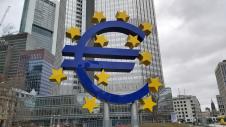Μemories of the debt crisis of 2010, when our country was in the eye of the cyclone, are brought back by the galloping Greek government bond yields, in the aftermath of the ECB's decision to end the bond purchase program, the impending increase in key interest rates and the general deterioration of international economic conditions.
The yield on the 10-year government bond widened in the previous days to 4.7% from 0.53% a few months ago, while Italian government securities were also under strong pressure, with the Italian 10-year bond reaching 4.5%, a develpoment raising concerns of a new debt crisis in Europe.
The surge in bond yields in debt held by southern European countries forced the ECB on Wednesday to hold an extraordinary meeting of the Governing Council to address market concerns, a meeting that did not yield any tangible results. The immediate action taken by the ECB, however, shows that even the ECB's "hawks" want to help relieve pressure on the periphery, recognizing that if the current turbulence leads to a crisis, the interest rate hike they want will not materialise.
There is no doubt that conditions internationally have deteriorated, putting pressure on the Greek economy as well, however, linking the increase in the 10-year bond yield today to the situation of Greece in 2010 is superficial and misguided. The domestic economy is in a strong position, with its budget, despite many extraordinary benefits, under control and the government fully understanding the importance of fiscal stability.
In addition, the domestic economy has significant growth potential in the two-year period 2022 - 2023. Growth will significantly exceed the eurozone average as the pressures on European economies from the current crisis are greater. Thus, the current crisis, fuelled by geopolitical developments, the energy crisis and inflationary pressures to some extent favors Greece's effort to catch up quickly with the eurozone.
These do not negate the new challenges that are being created, the risk of new NPLs in the banking system and dangerous political-economic complications, if there is no de-escalation of inflationary pressures in 2023. It is also necessary for the government to accelerate reforms, especially in the heart of the state, such as the judiciary system, public administration and education.
Three points make the difference
According to bank executives and economists, there are three main points that seperate the country from the 2010 debt crisis, fuelling optimism about the country's course:
1. Strong economic growth. The Greek economy will experience strong growth rates in 2022, achieving more than double the eurozone average. In the first quarter, growth reached an impressive +7%, while this year domestic GDP is expected to grow close to +6%, compared to +2.4% in the Eurozone, boosted by two powerful growth drivers. The first is the strong course of tourism, with revenues reaching at least 17 billion euros this year (approaching 2019 levels) compared to 10 billion euros in 2021 – while according to estimations the bar is set even higher. The second driver is the boost from the return of the domestic economy to normality and the growth of private consumption.
2. Particularly favorable debt profile, small refinancing needs. In contrast to 2010, when the Greek debt was completely held by private investors and the refinancing needs of Greece were very large, the situation today is radically different. More than 70% of government debt is held by the official sector and is not in the market. Today, Greek debt has an average maturity of 20 years with a weighted average service cost of 1.4%, which means it is secured against interest rate hikes. In addition, annual refinancing needs are very small.
3. Regaining credibility, returning to normality. Greece has now healed the wounds of Greek statistics and unreliability, with the Mitsotakis government having managed to lead the country to the other side, gaining the trust of the international investment community. It is worth noting that the current crisis is not related to Greece but is the result of more general developments. Τhe above data on Greece and the country's prospects are in stark contrast with the picture that is reflected both in the bond and stock markets. Banking sources estimate that through the pressures on Greek and primarily Italian bonds, traders are testing the ECB on when it will step in interest rates. As far as the stock market is concerned, they note that the turmoil reflects the wider turmoil in the markets and not the Greek reality.
What Alexis Patelis and Ilias Lekkos say to Business Daily

The Head of the Prime Minister's Economic Office, Alexis Patelis, stresses to BD: "In the long term, low inflation ensures the purchasing power of our weakest fellow citizens. Economic theory says that taming inflation - which we all want - goes through rising interest rates. As announced by the European Central Bank, this will be front-loaded, starting next month. Greek government debt has a long-term horizon - over 20 years on average - and at an interest rate that has been largely locked in through swaps. The private sector did not participate in unrestrained credit expansionseen in other countries. However, the money in Greece will become more expensive and the interest rates on floating loans will increase."

Ilias Lekkos, Head of Economic Analysis and Investment Strategy of Piraeus Bank Group, says: “The Greek economy is expected to achieve a particularly high growth rate in 2022 despite the challenges posed by the international geopolitical environment, the energy crisis and inflationary pressures. Domestic economy is expected to grow this year close to +6%, compared to around +2.4% for Eurozone member countries. Despite the uncertainties of the war, the Greek economy, through the acceleration of investments with the RRF, could achieve an even better performance in 2023 compared to eurozone countries by further improving the country's macroeconomic picture, especially on the debt-to-GDP side. In addition to strong growth rates, Greece has an excellent debt profile and has regained its credibility, characteristics that make the country extremely resilient to the current turbulence in the bond market."









